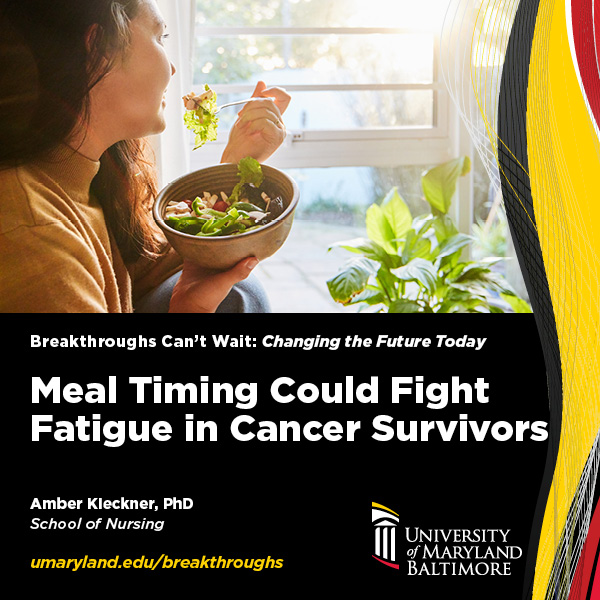Breakthroughs Can’t Wait: Is Intermittent Fasting the Key to Feeling Better After Cancer?
August 06, 2025 UMB Office of Communications and Public Affairs
Amber Kleckner, PhD, School of Nursing assistant professor, studies how time-restricted eating could help survivors reset their internal clocks and restore the energy that treatment often drains away.
At the University of Maryland, Baltimore (UMB), groundbreaking discoveries happen every day — transforming medicine, improving health, and shaping the future. From changing legal policy to pioneering treatments to cutting-edge scientific breakthroughs, UMB researchers are tackling real-world challenges and making a lasting impact on lives everywhere.
In our “Breakthroughs Can’t Wait: Changing the Future Today” series of videos, we will dive into inspiring stories of innovation from across UMB’s seven schools. See how scientists, doctors, and experts are addressing today’s most pressing issues — fueled by the critical support of government funding that drives progress forward.
A simple change in meal timing might hold the key to helping cancer survivors reclaim their energy.
At the University of Maryland School of Nursing, Amber Kleckner, PhD, assistant professor, is studying how time-restricted eating — consuming meals only during daylight hours — could help survivors reset their internal clocks and restore the energy that treatment often drains away.
“Everyone expects to feel tired during treatment,” Kleckner explained. “But then after chemotherapy treatment and radiation treatment, when the cancer is cured, people expect that the fatigue will go away, too. However, oftentimes it doesn't, and people don't know why.”
Her lab is building on years of research into circadian rhythms, or the body’s internal clock, to see whether aligning meals with natural cycles can improve sleep, boost energy, and support overall recovery in cancer survivors.
“When you really delve into the evidence-based research on nutrition for survivorship, there isn't a lot out there,” she noted, and said her goal is to offer more than the vague diet guidance survivors often receive.
“If this research isn't done, people are going to keep guessing. They're going to keep going to websites, reading anecdotes on forums,” she stressed. “They're not going to have that larger clinical trial that actually — scientifically — can demonstrate whether it's effective or not.”
In a new video Q&A, Kleckner shares how nutrition can empower survivors and why evidence-based guidance is essential for long-term recovery.
Read more about how University of Maryland, Baltimore researchers are tackling real-world challenges and making a lasting impact on lives everywhere.